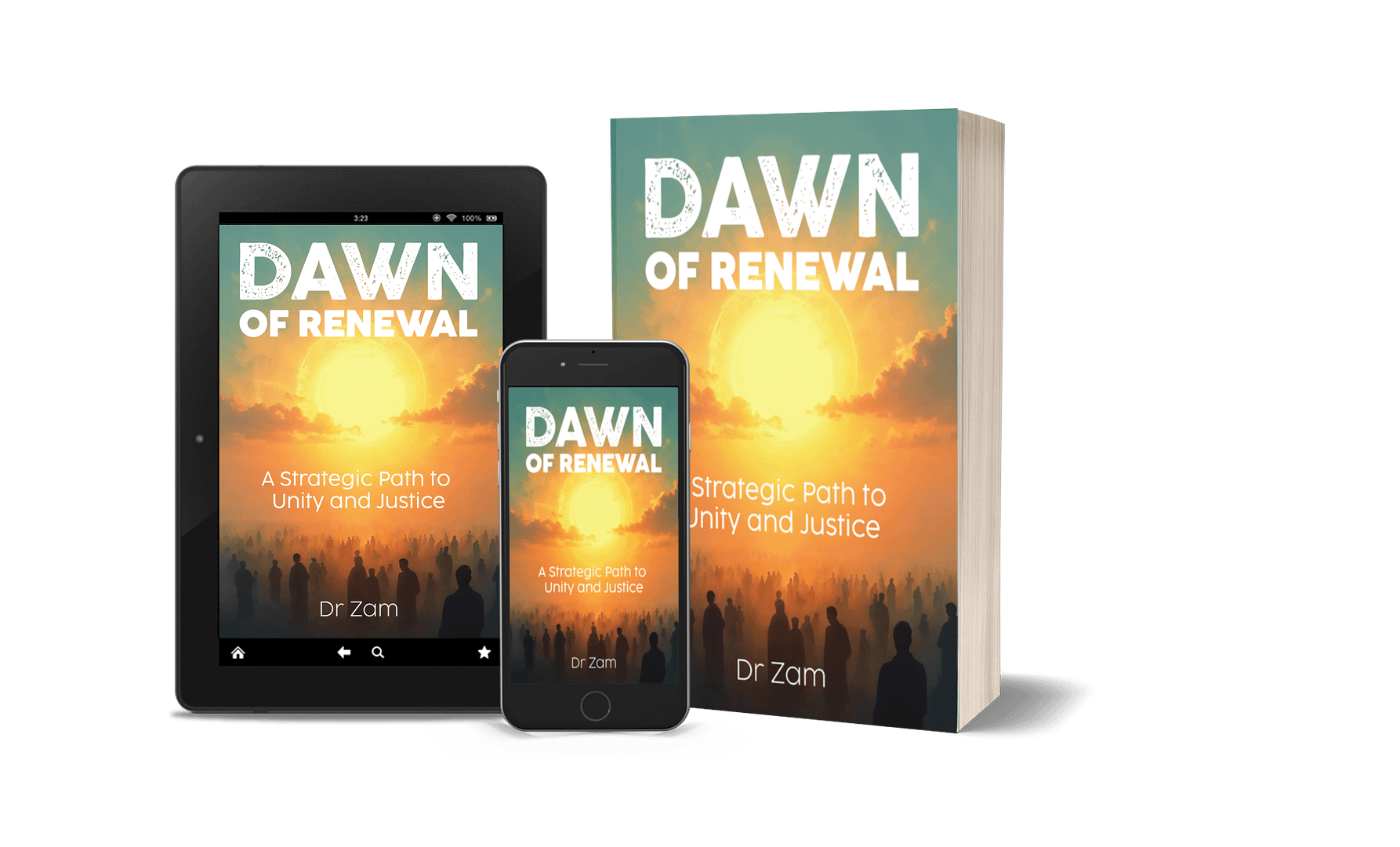Dawn of Renewal:
The Strategic Path to Unity and Justice

Read Dawn of Renewal Online – Anytime, Anywhere!
Glossary of Key Terms
This Glossary underscores the rich tapestry of language and concepts that guide and inspire the ummah. Whether referencing fiqh rulings or describing modern organizational structures, each term reflects centuries of intellectual heritage and the enduring resonance of divine revelation. We pray that these definitions not only aid your reading of Dawn of Renewal but also inspire your continued pursuit of knowledge, unity, and service for the sake of Allah.
Should you have suggestions for additional terms or clarifications, please reach out to the WIE team at info@WorldIslamExpo.com. We welcome community input to refine and expand this collective resource over time.
How to Use the Glossary
- Quick Reference: Whether you’re a newcomer to Islamic terms or a seasoned student, this glossary clarifies the key words used in the book’s chapters, appendices, and membership resources.
- Study Aid: For deeper study, pair these definitions with the Resource List (Appendix D) to explore recommended books and online platforms that expand on each concept.
- Communal Orientation: Local chapter leaders can share this glossary with new or non-Muslim participants to familiarize them with the key aspects of Islamic terminology, ensuring respectful and informed dialogue.
- Living Document: Islamic thought and community structures evolve over time. The WIE may periodically update this glossary with newly emerging terms or clarifications as our network grows.
Aqidah (عقيدة)
Refers to the creed or foundational beliefs in Islam, including belief in one God (tawhid), the Prophets, the revealed books, angels, the Day of Judgment, and divine decree (qadar).
Amanah (أمانة)
A trust or responsibility. In an Islamic context, holding a position of leadership or being entrusted with communal resources is viewed as an amanah before Allah.
Da‘wah (دعوة)
Literally “invitation.” It refers to inviting others—both Muslims and non-Muslims—to understand and practice Islam correctly. Da‘wah can be formal or informal, public or private.
Dhikr (ذكر)
Remembrance of Allah, often through short phrases or prayers repeated softly or silently. Dhikr can also mean mindful awareness of Allah in the heart at all times.
Eid
A major Islamic festival. There are two principal Eids:
- Eid al-Fitr (celebrated at the end of Ramadan), and
- Eid al-Adha (coinciding with the Hajj pilgrimage season).
Fiqh (فقه)
Islamic jurisprudence—the human understanding and application of Sharia (Islamic law). Different schools of fiqh (madhāhib) provide diverse interpretations of legal rulings.
Hadith (حديث)
A recorded statement, action, or tacit approval of the Prophet Muhammad (peace be upon him). Hadith collections, such as those by Al-Bukhari and Muslim, are primary sources for understanding the Sunnah.
Halaqa (حلقة)
An Islamic study circle or gathering, traditionally for discussing Quranic verses, hadith, or aspects of faith. These gatherings foster spiritual growth and communal bonding.
Ihsan (إحسان)
Excellence or perfection in worship and conduct. The Prophet (peace be upon him) described ihsan as worshiping Allah “as if you see Him,” emphasizing sincerity and utmost devotion.
Ijtihad (اجتهاد)
Independent reasoning applied by qualified scholars to derive legal rulings from the Quran and Sunnah when explicit texts or consensus are not available.
Imam
A term with multiple meanings:
- The leader of congregational prayer (salah).
- A spiritual or community leader with recognized knowledge of Islamic teachings.
Madhhab (مذهب)
A school of thought within Sunni jurisprudence, such as Hanafi, Maliki, Shafi‘i, or Hanbali. Also applicable to other Islamic denominations. Each madhhab has its methodology for interpreting Sharia.
Maqasid al-Sharia (مقاصد الشريعة)
The higher objectives or goals of Islamic law, which include the preservation of faith, life, intellect, wealth, and lineage (or honor). They guide how rulings should align with overall justice and welfare.
Masjid (مسجد)
A mosque—a place of worship for Muslims. In a broader sense, the masjid can function as a community center, a hub for education, social services, and interfaith activities.
Riba (ربا)
Interest or usury, prohibited in Islam. Islamic finance avoids riba-based transactions, favoring profit-sharing models that align with moral and ethical guidelines.
Sharia (شريعة)
The moral, ethical, and legal framework of Islam, drawn from the Quran and Sunnah, encompassing both personal acts of worship (ibadah) and social, economic, political principles.
Shura (شورى)
Consultation. A Quranic principle mandating that leaders and communities engage in collective decision-making. Rooted in the verse, “Those who conduct their affairs by mutual consultation” (Surah Ash-Shura 42:38).
Sunnah (سنة)
The way, practices, and example of the Prophet Muhammad (peace be upon him). Together with the Quran, it forms the core of Islamic guidance.
Taqwa (تقوى)
God-consciousness or piety—awareness of Allah in heart and mind, spurring one to do good deeds and avoid sin. It is central to a believer’s moral and spiritual life.
Tawhid (توحيد)
The oneness and uniqueness of Allah. It is the cornerstone of Islamic belief, emphasizing that there is no deity worthy of worship except Allah alone.
Ummah (أمة)
The global community of Muslims, transcending racial, ethnic, and national boundaries. The word implies shared faith, mutual care, and collective responsibility.
Waqf (وقف)
An endowment in Islamic law. A donor dedicates property or funds for charitable purposes—such as building schools, hospitals, or libraries—to benefit communities perpetually.
World Islam Expo (WIE)
The global network and initiative described throughout Dawn of Renewal. It unites Muslims across continents through digital tools, local chapters, specialized committees, annual conferences, and various partnership-driven projects.